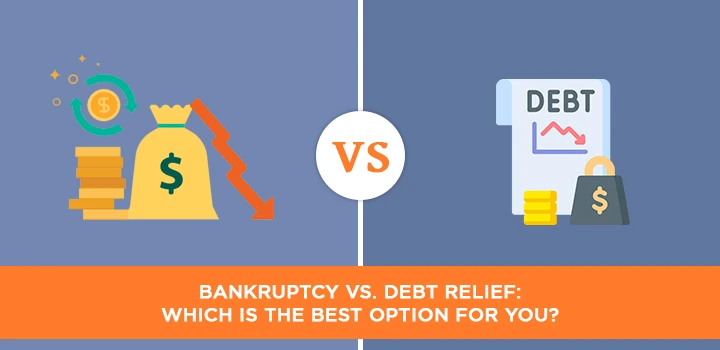
People who have excessive debt might think about bankruptcy or debt relief as viable solutions. For those trying to control their debt, debt relief is a less extreme choice; bankruptcy gives instant and total debt relief. For people who qualify for debt consolidation or can make lowered payments via debt settlement, bankruptcy may not be the best choice, nevertheless. The best choice will ultimately rely on personal circumstances like debt level, pay capacity, and long-term financial objectives. Before deciding on what line of action to follow, people should investigate and completely grasp their possibilities.
Understanding the difference between bankruptcy and debt relief
Those battling excessive debt must first understand the distinctions between debt relief and bankruptcy. Whether a debtor files under Chapter 7 or Chapter 13, Bankruptcy is a legal process that may either discharge all or a portion of their obligations. Debt relief, on the other hand, is the many techniques of debt reduction or reorganization, including consolidation or creditor negotiation. Only if all of the creditors are ready to engage will Debt settlement be effective; otherwise, bankruptcy might be required. Although bankruptcy is a more extreme decision, some people might find it to be their best one. On the other side, debt relief is a less extreme answer but its success relies on the debtor's capacity to qualify for a new loan or negotiate with creditors. To decide the best course of action for handling excessive debt, one must ultimately consult professionals.
Examining your financial situation
Managing personal money requires first an examination of one's financial circumstances. It helps people to know where their money is coming from, where it is being spent, and how they could better their financial circumstances.
Finding one's net worth comes first in analyzing their financial status. This clarifies if a person is struggling to pay bills or earning money rapidly.
Understanding job contracts and pay slips is thus very vital to find out how one gets compensated. One should then strike a balance and monitor their budget to prevent overspending by keeping within the one that fairly shows their financial status. Maintaining records helps one also keep track of where the money is used and be honest in predicting costs. Credit records and bank statements may also be examined to spot unapproved loans or accounts or abrupt changes in financial circumstances. Giving self-improvement priority, one should not overlook looking at their money condition as it will enable them to create better financial practices and reach their financial goals.
How bankruptcy can affect your credit score
An individual's credit score may be much changed by bankruptcy. This is so because it is seen as an indication of inadequate money management and a financial failure. A person declaring bankruptcy will have a bad record on their credit score for many years—even up to a decade. This will make future credit or loan applications harder, and should authorized, the interest rates would probably be much higher. Bankruptcy should only be regarded as a last choice as the repercussions could be severe and long-lasting. Those in extreme debt should think about getting financial guidance and investigating choices before declaring bankruptcy.
Alternatives to bankruptcy and debt relief
When people and businesses find increasing debt, they may take into account many alternatives to bankruptcy. Negotiating with creditors allows one to prolong the loan payback term or lower loan interest rates. Seeking debt relief via debt restructuring—which entails deferring arrear payments and maybe acquiring additional loans to meet immediate needs—also presents another choice. Debt forgiveness may sometimes also be possible. For those living in Scotland, the Debt Arrangement Scheme could also provide a workable debt management strategy. Before thinking about bankruptcy, it's advisable to investigate all the other options as this one could have long-lasting effects. Furthermore helping to reduce the load of unsustainable debt on people and businesses are legal and institutional structures for handling bankruptcy.
Choosing the best option for your situation
Making certain choices may be difficult; choosing the best one can be difficult as well. Making a good choice requires one to give their circumstances great thought. Investing some time to choose the correct conference call system, web hosting package, or antidepressant can help you greatly. Overcoming any anxiety or enthusiasm allows one to make a beautiful confession or have a fruitful discussion with a trained specialist to acquire individual guidance. One should also give any other elements, like cost, quality, and technical needs, some thought. To make the greatest choice for their particular situation, people should not hesitate to ask questions or pursue more knowledge. Making careful decisions guarantees favorable outcomes and helps to prevent later related issues.
Taking steps towards financial wellness post-bankruptcy or debt relief
Long-term stability depends on following the required actions towards financial health even if attaining bankruptcy or debt relief might be challenging. Changing money management habits comes first among the things to do. This might include developing a budget, cutting pointless spending, and saving more. One also has rights over credit reporting and debt collecting, which should be known. Achieving financial well-being also depends critically on knowing all your revenue sources and creating a financial strategy. Additionally beneficial is combining debt with a second mortgage or personal loan. These steps will help people to take charge of their money and aim towards a more safe financial future.
Call on (888) 803-7889 for free consultation now!
Resource
How to Fix Your Credit Fast | 10 Easy Steps to try
Credit cards for bad credit December 2022
Credit repair companies: What to look for in 2023?